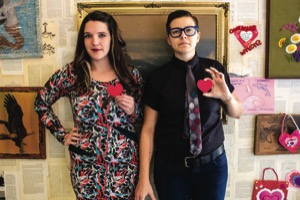
| PHOTO: SNAPPED BY I AM LOST


San Diego’s award-winning lesbian folk/pop band talks about love, life and the healing power of music
True, lovebirds are a pair from one of nine species of the genus Agapornis which are known for their social bonding habits. The pair will sit nestled next to each other for hours at a stretch, one never once giving the appearance of wanting to be away from the other. The Lovebirds, however distinctive, whatever genus, are also a folk/pop band from San Diego. They are comprised of Lindsay White and Veronica May and if you come into contact with them, however peripherally, you can see how and why they chose to be known collectively as The Lovebirds.
Their melodies, an extension of their intertwined selves, are instantly recognizable for their smoky, affectionate and whimsical qualities. But, when circumstances dictate, they induce layered, complex rhythms in songs like “Catch The Rain” (Breakup Shmakeup) or “Love You Like The ‘80s” (And a One, And a Two). No surprise really, as anyone will come to know by investing nine-or-so minutes in their first documentary Breakup Shmakeup: The Lovebirds Documentary. It is less a prototype quirky-artists-as-doc-subject and more, much more, a gripping view into the world of two artists, one afflicted with Bipolar One Disorder which heeds neither generation nor circumstance nor time, the other not.
There is Veronica May, whose wind is ferocious and takes in everything in her path. Intelligent, insightful, self-consumed and addictive, her sartorial tastes alone keep you wanting more of her. She owns, for now, Bipolar Disorder.
And there is Lindsay White, translucent, playful and the caregiver; the one who articulates the other half of their symbiosis with a far less self-conscious need for self-expression.
But together, their story is one of the best-hidden and possibly most universal tales of the ages. Two strangers, who fall in love, move in together and go on to write some of the most rhapsodic songs of their day. Shakespeare in love, though time and circumstance would change.
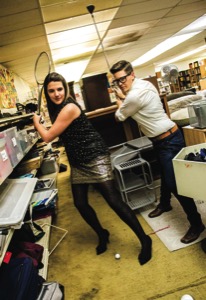
As Lindsay White succinctly sums it up, “Our band’s mission goes further than our passion for music: we are also involved in mental health and LGBTQ advocacy. Our journey has included romance, breakups, breakdowns, divorce, hospitalization and everything in between – thank goodness for the healing power of music.”
Just ahead of their U.S. tour we were fortunate enough to catch up with The Lovebirds and get to know more about these two incredibly talented women.
How did you first meet? Had you been in anything resembling a relationship prior to the two of you getting together? How long had it been?
Veronica May: We met in the music scene. She was in a band called Lindsay and The White Lies and I was in a band called Veronica May and The To Do List. I had gotten out of a sad breakup before dating Lindsay. She actually really helped me through it as a friend. Even as a friend now she helps me through things. She’s there for me.
Lindsay White: Yeah, we were both kind of hot-mess-status when we first started hanging out, which is often the perfect time to forge a friendship, right? I was just going through a divorce and coming to terms with my sexuality. I lost a lot of friends in the wake, and Veronica helped open up a whole new world of music and friendships for me. We dated for about three years, and now we’ve been broken up for almost as long. We decided the musical partnership was important and worth salvaging. I know our relationship is much stronger now as friends than it was before, and we are both in happier, healthier partnerships with other people! The passage of time is a magical thing.
Your documentary traces the narrative arc of your music, both as songwriters and singers. Has there been one artistic period particularly satisfying to each of you? If so, which?
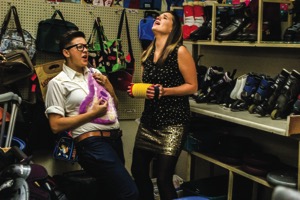
VM: Really the music after the breakup was pretty satisfying. Music is therapeutic. It helped me process through how I was going to navigate the fresh break eloquently and with respect. We went on a month tour weeks after the breakup. We stayed strong and we stayed the course.
LW: I agree that we wouldn’t have made it through the breakup without the songs we wrote at that time. But one thing I really miss is how easily we were able to write songs together. I have the fondest memories of writing songs on a couch, or porch, or park, or coffee shop. Almost anytime we sat down together somewhere, we created something so unique that we could have never done on our own. Naturally we don’t spend as much time together anymore, so co-writes are less spontaneous as a result. Hopefully we’ll remedy that on this tour and come up with a few new tracks for our next album.
Describe Bipolarism in a way that the average layperson can understand.
VM: Just to clarify, it is just Bipolar. It’s not like lesbian=lesbianism, though I wish it were. I have Bipolar One Disorder which is the more extreme high and low and usually more high; sounds fun but it’s only fun for a few days and a big, big crash is inevitable. I suppose there are many metaphors for the many aspects of Bipolar. Most of the time I feel like I used to before I had the episodes; pretty “normal.” But there are weekly reminders that my mind is not chemically balanced. During times of instability, particularly mania, it’s like I’m in a movie. It’s maybe like The Truman Show when Truman realizes it’s all about him. Everyone has been watching him. Paranoia is a very common theme. Simile for the depressive side: It’s like you’ve sunk down through the center of the Earth out to the universe past hell and into black space. It’s paralyzing. Simile for mania: It’s like I’m a severed live wire. It’s paralyzing. A common fear for people with Bipolar Disorder is knowing that it doesn’t go away.
Maybe to sum it up I would go into a song I wrote called “Gray.” It’s like your mind is the ring of a boxing match. Inside the ring are two very different but very strong contenders. Depression in one corner wearing black, mania in the other wearing white. I sit there watching and hoping they can just dance around the ring or lean against the ropes on their own sides. But I know throughout my life the contenders will fight. They never leave the ring. I know throughout my life that it is very possible and probable that one contender will win. One will be defeated. I know throughout my life that I’ll do everything in my power to tame the hurricane.
What are the stereotypes for each of you in your respective roles?
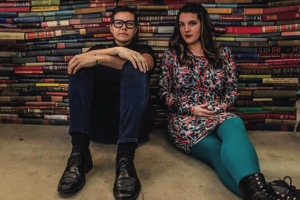
VM: It’s hard to know what the stereotypes of Bipolar One Disorder are, being that I have it. I don’t remember thinking much of it before I was diagnosed. I feel like there are times when my friends/girlfriend feel like they are walking on eggshells when I’m so unbalanced. I have definitely broken many of the stigmas associated with the illness. People think mental illness and they think: Incapable, burden, dangerous … so many different negative assumptions. It’s not true. There are notable people, Van Gogh, Robin Williams, Teddy Roosevelt, who suffered and succeeded through Bipolar Disorder.
LW: We have a tendency to treat mentally ill, homeless, poor, and/or drug-addicted populations as ugly stepchildren of society. We do everything in our power to push them to the fringes because they’re “not our problem.” If we worked together to erase stigma and offer preventative treatment, compassionate support and effective resources, it would be such a win-win for society as a whole. Experiencing mental illness from the caretaker’s side, I want to stress that those diagnosed are not the only ones who need resources. I was lucky enough to have friends and financial support to get me through Veronica’s episode a few years’ back, but so many caretakers have absolutely nothing. Taking care of a mentally ill person was a lonely, traumatic, life-consuming task that I approached with as much fear as I did love. You spend so long becoming an expert on storm-weathering, then you are forever terrified that any tiny gust of wind will turn into a full-blown tornado, and you wake up one day to discover you are no longer helping to clean up the wreckage, you are the wreckage. No one should have to go through that alone.
You’ve spoken eloquently and, at the risk of sounding glib, grippingly about episodes of mania, Veronica. Would you be willing to share what an episode is like for each of you?
VM: It’s the A bomb. It destroys everything around me. It is the most traumatic event. It’s living the nightmares even nightmares are scared of. It’s hell. However, I owe a lot of who I am to these times. I am an extremely empathetic, compassionate and forgiving person because of my illness. I’ve done awful, humiliating things in mania. It’s humbling and it’s a crash course in character building. In retrospect, getting through an episode is a lot like moving to a house that is a lot smaller than the house you are in. You get rid of everything. It’s really hard but you have no choice in the matter. But, once you get to the new house, you realize you have a fresh start again.
Can you give our readers the clearest example to date from your musical canon where the song reflected the moment you two were going through? Why that song? Why that moment?
VM: I think one of the songs that means the most to us as a band is “Love is All it Takes.” Lindsay wrote it. At the time it was a song about our relationship as a couple and how it would stand the test of time. Even though we aren’t a couple, we have stood that test of time.
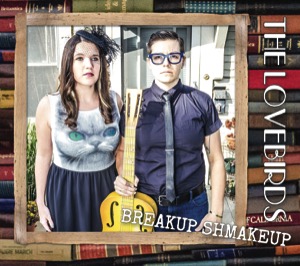
LW: There’s a song called “Ring Around the Roses” from our first album Nutsy Pants. I was just getting my bearings when it came to dating a person with mental illness – it was all new to me. I have my own issues with anxiety so I was trying to teach myself how to live in a state of constant observation without letting it take over my life. On one hand, I felt blessed to be able to occupy such an intimate and often beautiful space with someone I loved so much. On the flip side, I was so fearful that not being able to accompany her to those high and low places would essentially render me less valuable or interesting as a partner. It’s hopeful and hopeless at the same time.
What are you both hoping for?
VM: I’m hoping we continue to make music that makes a positive impact in the world. I’m hoping we make music that gets people talking about real situations. I’m hoping we continue to enjoy making music together. I guess it’s less of a hope and more of a reality. I feel like I’m living my dream, and part of that dream is The Lovebirds.
LW: This band has provided a platform to address so many important issues. Sure, it’d be nice to write a hit song or book a huge festival or score a major film placement, but that’s not the end goal. I only wish audiences demanded more from musicians and the music industry in this regard. Music is such a healing, barrier-breaking, universal language. Imagine what we could achieve if we gave it the proper respect and used it to say something rather than sell something.
To learn more about The Lovebirds, Lindsay and Veronica and their upcoming tour, visit TheLovebirds.com